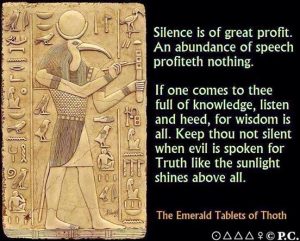Ancient Egyptian society treated men and women equally. Women participated in the political, economic, and judicial world of ancient Egypt on the same terms as men. This social system reflects Egyptian mythology, where Goddesses played an equal, if not a chief, role. The primeval mother-figures in the earliest prehistoric Egyptian myths are female.

Egyptian Philosophical Texts
The Egyptian philosophical texts offer cosmologies and cosmogonies, treatments of time and history and eternity, ethical teachings and analyses of justice and power, accounts of the gods and of the structured relations between them, divisions of the soul and narratives of eternal life, descriptions of the power of language and other sign systems, and subtle manipulations of mythological systems that elaborate the widest possible range of philosophical issues, from the relation between the One and the Many, to the divine nature of wordplay, to the analysis of life-giving as well as hostile forces.
Egyptian Creation Texts
Egyptian creation texts repeatedly stress the belief of creation by the Word. When nothing existed except the One, he created the universe with his commanding voice. The Egyptian Book of the Coming Forth by Light (wrongly and commonly translated as the Book of the Dead), the oldest written text in the world, supports this theory.
The ancient Egyptians believed that man was composed of three parts: the body, spirit, and soul. The fate of the soul was determined by its actions during life, whether good or bad, and the amulets, prayers, and gifts offered to gain the favor of the gods. Egyptian philosophers were intensely concerned with questions of proper conduct and justice. Many Egyptian texts advise the reader on how to act properly.
Attributes of Egyptian Philosophies
The three main attributes that all Egyptian philosophy share are flexibility, pragmatics, and attention to emotion. It is difficult to separate Egyptian philosophical ideas from religion. Maat stood at the center of all Egyptian life, including both Egyptian philosophy and religion. Maat itself was a goddess and in some periods had a temple.
In the Book of the Dead, the heart appears in the context of being without blame (i.e. in harmony with Maat). The deceased did not wish to lose his or her heart after judgment, for the “ab” was the seat of the “ba” (before it entered its “sâh”). Judgment came after the mummy has been reactivated so that it could speak and adapt to its new environment.